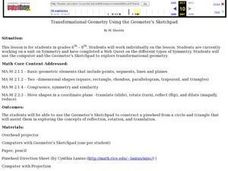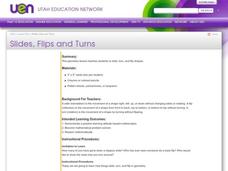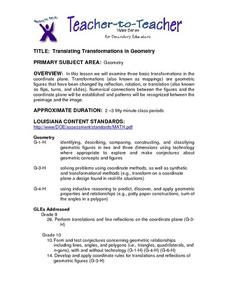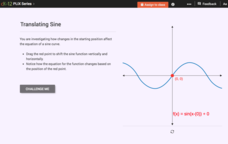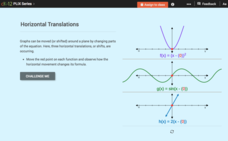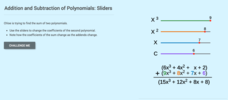Curated OER
Slides, Flips. Turns......It's All On A Memory Book Page
Fourth graders use tangram sets to investigate the congruence of shapes. They use congruent shapes to demonstrate the properties of slides, flips, and turns. They complete a math journal entry that describes and illustrates each concept.
Curated OER
Geometry Jeopardy!
A list of instructions for this exciting Geometry Jeopardy game is included on slide 2. There are a total of 25 clues and 5 categories, including: solids, triangles, lines, angles, and grab bag. Tip: Play this Jeopardy game with your...
Curated OER
Motion Geometry
Second graders experiment with slides, flips and turns to understand motion geometry. In this motion geometry lesson, 2nd graders navigate interactive motion geometry sites. Students illustrate the results of motion using paper models...
Curated OER
Slides, Flips, and Turns
In this geometry worksheet, 2nd graders review how to determine which piece would complete the geometric shape that is pictured. They circle whether it was a flip or a slide to move the piece into position. They draw or write to explain...
Curated OER
Transformational Geometry Using the Geometer's Sketchpad
Learners complete a webquest on the various types of symmetry. Using a computer, they explore the concepts of transformational geometry and identify points, segments, lines and planes. They experiment with the rotation of a quadrilateral...
Curated OER
Transformations-Shapes on the Move
Students examine transformations. In this math lesson, students view and describe flips, slides, and turns. Students practice making transformations with shapes.
Curated OER
Geometry: Flip, Turn or Slide?
For this geometry worksheet, students check either flip, turn or slide next to a letter to determine which has been done to it. A reference web site is given for additional activities.
Curated OER
Slides, Flips and Turns
Third graders are introduced to the meanings of the concepts slides, turns, and flips in how they relate to Geometry. As a class, they use their bodies to demonstrate how each term should look like. To end the lesson, they apply the...
Curated OER
Translating Transformations in Geometry
High schoolers create an image using given coordinates and evaluate how the coordinates change when a slide or rotation takes place.
Curated OER
Flips, Sides and Turns: Exploring Transformations
Students use an online dictionaries to define key geometric terms. They explore several websites to help them differentiate the terms reflections, translations and rotations as they apply to geometry and then complete an assessment...
CK-12 Foundation
Simplifying Rational Expressions: Sliding Solver
Build a strong understanding of simplified rational expression with your classes. An interactive lesson helps scholars discover the equality between the original expression and the simplified expression. Questions help individuals focus...
Curated OER
Get in Shape with Geometry
Using geoboards, computer programs, and hands-on manipulative materials, elementary schoolers engage in a study of two and three-dimensional geometric shapes. This instructional activity is chock full of good teaching ideas on the...
Curated OER
Quandaries, Quagmires, and Quadrilaterals
Students classify, flip, slide, and turn a quantity of quadrilaterals.
Curated OER
Geometry: Flip, Turn or Slide?
For this flip, turn or slide worksheet, students determine which has been done to a set of letters written on grids. A reference web site is given for additional activities.
Curated OER
Slides, Flips and Turns
Third graders slide, turn, and flip their bodies to explain sliding, turning, and flipping geometric shapes.
Curated OER
Motions In Geometry
In this motions in geometry worksheet, students draw translations, rotations, and reflections. This three-page worksheet contains examples, instructions, and 6 problems. The last page contains answers.
CK-12 Foundation
Translating Sine and Cosine Functions: Translating Sine
Learn how to slide sine back and forth and up and down. Pupils move the starting point of a graph of sine vertically and horizontally. They investigate the changes to the equation of the graph in relationship to the translation. They...
CK-12 Foundation
Horizontal Translations or Phase Shifts: Horizontal Translations
Find out what causes a function to slide. Pupils move a function along the x-axis and see the resulting change in its equation. Scholars determine the effects that the translation has on the intercepts, domain, and range of the function.
CK-12 Foundation
Addition and Subtraction of Polynomials: Sliders
Slide the coefficients to determine sums of polynomials. The interactive contains sliders to change the coefficients of an addend in a polynomial addition problem. Pupils determine the coefficients of the addend to arrive at particular...
CK-12 Foundation
Intercepts by Substitution: Finding a Linear Product Using a Quadratic
Discover another way to interpret multiplication. Using an interactive, learners slide points (representing the factors of multiplication) along the x-axis of the graph of y = x^2 and observe changes in the line segment connecting the...
CK-12 Foundation
Sets: Bikes or Boards?
Do people ride, slide, or do both? Pupils use an interactive Venn diagram for the numbers of people owning bicycles, owning skateboards, or both. An interactive provides questions for them to answer using the diagram.
CK-12 Foundation
Slope: Hiking in the Woods
Learning about slopes from a hike in the woods is a walk in the park. Scholars slide a cutout of a person to simulate a hike along several paths. Passing through indicated points reveals the type of slope (positive, negative, zero, or...
CK-12 Foundation
Vertical Line Test: Exploration
What do vertical lines have to do with functions? Individuals slide a vertical line through four different graphs. They use that vertical line test to determine if the graphs represent functions.
CK-12 Foundation
Linear and Non-Linear Function Distinction: Domain and Range of a Function
Functions are special types of relations, but what makes them so special? Pupils use an interactive to slide a vertical line across six different graphs. Ten challenge questions then assess understanding of functions.






